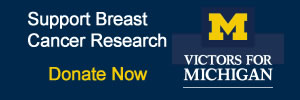Triple-Negative Breast Cancer
Triple-negative breast cancer cells do not express three primary markers – estrogen receptor, progesterone receptor, and HER2 receptor - that are known to play a role in breast cancer. Approximately 10% to 20% of breast cancers are triple-negative.
Because triple-negative breast cancer cells do express these receptors, this means that the growth of the cancer is not fueled by the hormones estrogen and progesterone, or by the presence of too many HER2 receptors. Therefore, triple-negative breast cancer is not treated with anti-estrogen (such as tamoxifen or aromatase inhibitors) or therapies that target HER2 receptors (such as Herceptin).
Who gets triple -negative breast cancers?
Anyone can get a triple negative breast cancer. However, it is more common in:
Younger people
Triple-negative breast cancer is more likely to occur in women younger than age 40 or 50; other breast cancer types are more common in older women.
African-American and Hispanic women
Triple-negative breast cancer most commonly affects African-American women, followed by Hispanic women. Asian women and non-Hispanic white women are less likely to develop this type of cancer.
People with a BRCA1 mutation.
When people with an inherited mutation in the BRCA1 gene develop breast cancer, it is often triple-negative.
Researchers do not yet understand why premenopausal women and women in some ethnic groups have higher rates of triple negative breast cancer – compared to other groups of women.
Treatment for triple-negative breast cancers
Triple-negative breast cancer is typically treated with a combination of therapies such as surgery, radiation; and chemotherapy. Often chemotherapy is given first, before surgery is performed, especially when tumors are larger or lymph nodes are involved.
While many triple-negative cancers are aggressive, your doctor’s prediction of how well your treatment will work depends also on the tumor size, whether the cancer has traveled to the lymph nodes and how well the cancer shrinks when chemotherapy is given. There are some very effective treatments for triple-negative breast cancer. Your doctor will work with you to find the treatment that is right for you.
If you or a loved one suspects triple-negative breast cancer, please call and speak to one of our Cancer AnswerLine™ nurses: 800-865-1125 (Monday-Friday, 8am-5pm EST). They are experienced in oncology care, including helping patients and their families who have questions about cancer. They can also assist you in getting the appointment process started, if you decide to have your care at the U-M Rogel Cancer Center.

